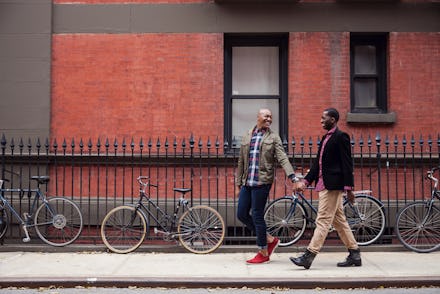We need to stop using the phrase "coming out"

The phrase “coming out” might seem simple but for many people, it can have dire consequences. In April of 2020, former Florida gubernatorial candidate Andrew Gillum announced that he is bisexual — this came a few months after his hotel scandal and subsequent very public outing. Immediately, social media erupted with conversations about this identity, many of them unabashedly shaming. These discussions addressed the “necessity” for LGBTQIA+ people to publicly identify themselves with a label for the benefit of heterosexual people, not for their own peace of mind or freedom.
To “come out” gives the allusion that non-heterosexual people are not “in.” The phrasing emboldens heterosexuality as the norm, rather than an identity on a spectrum of identities. It makes straightness the dominant identity — giving this group power over those who don’t identify as such. In this way, the words “coming out” are the residue of a system much like any other, that works to oppress communities. This is especially the case for Black and queer people, whose coming out can be fraught because of cultural stigma.
My identity as a queer person sometimes feels like it’s not exactly mine. The label itself feels like something I owe to everyone else. That’s why, I suppose, there is no such thing as “coming out” as heterosexual. There is no day of “I’m straight” declaration. On some level, it feels like people who don’t identify as queer need be made aware of our marginalized status in order to govern, shame, and in so few words eliminate — as death and violence is directly attached to the queer experience.
I want to be clear when I say this: I never came out. I was always out because I existed, even if only as a suppressed version of myself. My family knew that I was “different” and likely queer from a very young age. There was no hiding it. I was effeminate. From the time I was five, I was attracted to boys.
However, there was no safe space for that existence in public. I was already being called a fag and a sissy before I even knew what “identity” was, so my vocal acknowledgment of it wouldn’t have then afforded me any safety. In fact, it would have — and has — put me in danger.
When I finally decided to publicly identify as gay at the age of 25, it was a litany of “we been knew” from colleagues and friends, which I decode as “you could’ve/should’ve said something.” However, if the belief is that I owe you an explanation of my identity because it is non-hetero, it is your crucial responsibility to create the environment where that is safe.
I’m throwing away “coming out” and you should too. “Inviting in” is the term I like to use now, when it comes to being forthcoming about my identity. The same way you invite someone in your home, I cautiously, at 25, began inviting people in my life. I only began doing this when the happiness that living my authentic life outweighed the risk. I lost decades of living in my truth because of the power of oppressors.
However, “inviting in” gave me back power. It was the agency I needed. Any disrespect in my home meant you were no longer allowed. Although society still determines acknowledgement, acceptance, and tolerance of queer people, I got to decide who would have the benefit of enjoying me as I was fully Black and queer.
It’s 2020 and we still hand over all gender identity power to the sonogram. The doctor who makes a snap decision that determines the path of acceptability into society holds so much power. “It’s a boy” and “It’s a girl” aren’t just phrases of determining the gender of a child. Those phrases alone determine what colors you can wear or like, what sports and activities you can participate in, what job fields you should be interested, how you should dress, how much less money you will make.
I, along with so many advocates now, challenge the notion that gender assignments are necessary prior to watching and nurturing where a child’s natural inclinations outside the constraints of heternorms. As you watch where the kid gravitates, we should support, love, care for, and protect them. It’s that simple. This awards the child to invite you in, thus shattering a system where coming out is ever necessary.
I will continue to invite people in on my own time and fight for a day where gender and identity constructs are completely abolished. A declaration of my sexual identity isn’t owed to those who have no desire to protect it. And if we ditch the concept of "coming out," we can work towards a society that encompasses all identities, allowing people the space to live as they truly are.